- Home
- Gregory Maguire
Confessions of an Ugly Stepsister Page 6
Confessions of an Ugly Stepsister Read online
Page 6
The Master says hurriedly, “Now, good sir, don’t be distracted by the novelty of the girl. It’s the paintings of flora you wanted to see. I’ve set off the commonest of flowers with the commonest of faces, so you can judge my touch, my palette, my skill at arrangement. Beauty shines out even in the coarsest of materials if they’re arranged well. Not to put thoughts in your head, of course.”
“Of course not,” says van den Meer.
Another silence. Iris aches to peer over the ledge of the door, but she doesn’t dare. Why doesn’t the Master show the patron his secret gallery of misfits, dwarves, and other magic folk?
“Does the child know Dutch as well as English?” says van den Meer.
“You are here to look at paintings!” says the Master.
“She does, sir, she does,” interrupts Margarethe. “I am her mother.”
“And I am here to look at paintings,” says van den Meer. “Very well. Is this painting dry enough to move in a cart? It’s a fine painting, you know, it’s very fine. I like what I see. You mustn’t fight the tides of change so; life needn’t be so hard. There are fortunes to be made, there is slow recovery from the endless wars with Spain to be achieved, there is a place for all of us in the good times ahead, but you must not grasp with such lack of dignity at things of the past. Yes, bring the painting to my home, tomorrow if the weather be good. Yes,” says van den Meer, “bring the painting, bring the child as well.”
There is a pause. “Why the child?” says the Master. “She’s a sullen enough thing. Do you mean to assess my skills by mounting subject and portrait on a stage side by side? She won’t do it.”
“She’ll do what she’s told—” begins Margarethe.
“She won’t do it because I’ll tell her not to do it,” says the Master firmly.
But van den Meer only laughs. “I want nothing of the child’s looks, who could?” he says. “But if she’s a clever soul who can speak both Dutch and English, she might be of use to my household. Don’t worry. The ones who hold the purse strings will look at your painting and they won’t care about the model. But as long as you’re coming, bring the girl to my house, well scrubbed and courteous, and we’ll see what happens. It may solve a domestic problem and keep my good dame happy. In the meantime, I have little else to say. You’ve carried out your assignment well, and I hope that you’ll be engaged at the next stage of our venture. Here is coin to the amount we settled upon. Turn the picture to the wall now; no one should have to look on that longer than necessary.” He laughs, but none of the others join in. There is the sound of a canvas being shifted.
“And, you, lad,” says van den Meer, making ready to leave, “how do you like it here, living in the neighborhood of such a brilliant talent?”
“I am blinded, sir,” says Caspar. “A change from time to time would do me good. If there is some small work to be done in your household—”
“I don’t need a boy,” says van den Meer, “you wouldn’t do. Tomorrow, then.”
Iris races back to collect Ruth, her shoes on the stones ringing out a kind of alarm. However blank and smoky her childhood, however angry she is at the Master, however uncertain her feelings about Caspar, the idea of solving anyone else’s domestic problems seems suddenly a far more gloomy prospect. Where is the Queen of the Hairy-Chinned Gypsies when you need her? I’d be a changeling if I could, thinks Iris; turn me into a flounder, a sparrow, a dormouse. Better yet, turn me into an insensible chair with a broken rush seat, a nail on the hoof of a horse! Turn me into sad thick Ruth! Anything or anyone that is too dull to be able to think about herself. It’s the endlessly thinking about yourself that causes such heart shame.
Van den
Meer’s
Household
“I don’t see why I should go. I won’t be paraded as a freak.”
“There is every reason for you to go.”
“Why?”
“There’s no reason for you to know the reasons. Don’t be insolent.”
Iris has her hair brushed, her apron tied, her hands examined for dirt. She twists as much as she dares, and Margarethe slaps her when enough has become enough. Iris’s cheeks sting, but she doesn’t cry out. Margarethe, as if ashamed, turns away to the low worktable by the kitchen window. “Now wrap this bit of pastry in a cloth and present it to whoever greets you, and thank them well, in English and in Dutch, for their kindness.”
“I don’t know what kindness you are talking about.” Iris doesn’t turn her head, but she looks at her mother at an angle, like a bird. “What makes you think I would recognize a kindness if I saw one?”
“Ungrateful child!” cries Margarethe. She approaches her daughter with disbelief. “Do you know what it means to feed a family, and I with no living husband, father, brother, or son to turn to? Do you have any idea how near we are to throwing ourselves on the mercies of the Church or the city fathers? To have had to go from house to house begging for work—for you, stupid witless thing, it is a game. For me, this is my life, a horrid thing. God plagues the mothers of the world with worry, from His own sweet Mary to the meanest fishwife of the harborside!”
“I don’t care,” says Iris.
Margarethe draws in her breath and narrows her eyes. “You are too young to know how women must collaborate or perish,” she hisses. “Why should I keep you from that knowledge, what good does it do for you or for me? If you aren’t willing to behave and earn a coin when you can, whatever this van den Meer wants you for, I won’t answer to the amount of food that makes its way to Ruth’s bowl every night.”
Iris bites her lower lip and clenches her small hands together.
“You go and be clever, for that’s how you are made. Be a help to your mother and your sister, and stand back, child, from considering your own foolish thoughts. There’s no time in this world to indulge in those. Do you hear me? I say, do you hear me?”
“My ears hear you,” says Iris.
“Get away with you, then, and do as you are bid.”
Iris waits on the stoop. Ruth crawls up and puts her head in Iris’s lap. Iris strokes Ruth’s hair, which is badly in need of brushing. Out of habit, Iris searches for lice, and thinks about striking Ruth in the face, to punish her for being so slow of mind and useless.
Though she hates Ruth—she hates her—Iris will not see her big sister go hungry.
Her mother, now—another story. How agreeable to see Margarethe pilloried in the stocks and whipped by virtuous citizens. Of whom Iris would be the first to volunteer.
Around the corner of the house come the Master and Caspar, managing the offending canvas between them. They have hired a cart from a neighbor. They fumble like bumpkins, misjudging the height of the step and the depth of the cart. Iris imagines finding a knife from the kitchen and rushing up to slash the canvas to ribbons. But she doesn’t destroy the Master’s work, since so much hangs in the balance. Margarethe’s threat is an effective one.
Eventually, the donkey braying in impatience, the cargo is safely covered with a cloth. The Master, Caspar, and Iris wave good-bye to Ruth, who puts her finger in her nose.
All the way through the city streets Iris keeps close to Caspar. She’s forgiven him his part in tempting her to view the painting; how could her own sorry looks possibly be Caspar’s fault? Besides, with so much else to fear, she can’t afford to keep her distance from his good humor. See how he prances! Head high, hair tossed in the sea breeze like a horse’s mane, eyes darting left, right, settling on Iris to make sure she is keeping up, turning away to note a weathervane, a whitewashed chimney, a friendly lad grinning from a window.
The Master keeps his head down and his collar up. Iris suspects this isn’t so much to guard against the wind, as the weather still hasn’t turned bitter, but to protect against the gazes of Haarlem neighbors. Or maybe he’s guarding against the fact that there are few glances turned his way, few who really care whether he is coming or going.
Into the Grotemarkt. How orderly is this magical world t
hrough which ugly girls may trudge! Iris hears a ring, almost a musical tapping, like a clock striking. It’s a man sitting on the cobbles, his legs stretched out on either side of him, hitting stones in place with a hammer. And is that an echo, off the magnificent facade of the Stadhuis? No, it’s another man at the same task on the far side of the market square. Every little part of this world must be pounded into place. The whole world a huge ticking clock that tells God’s story of charms and punishments.
They reach their destination. It’s a house that fronts on the Grotemarkt, the very house against which Ruth leaned that first day—the house of the strange child. The so-called changeling child.
Van den Meer must be a man of means. The broad-shouldered home has a walled garden beside it. In plum-red brick interrupted by gray lateral stones, the house looms up two full stories, with a step gable pinching two abbreviated attics. At this late afternoon hour the sun doesn’t strike the front of the house, and the windows facing the marketplace are like panels of black water. The building looks august and—what is it—cautious? Like a house of secrets, like a cage of smoke.
No, thinks Iris, it is something about those dark windows—there in the topmost one, is that a face disappearing? As if unwilling to be seen by the approaching company? Is it the obscure child? Why does everything hide its true face here?
The Master hasn’t noticed this. He doesn’t even pause to look for the path to the kitchen yard. He hands the reins of the donkey to Caspar and walks up to the door, which is almost level with the cobbles. He knocks briskly.
“Yes, yes, but come in,” says a man’s voice, sounding busy, irritated. “I’ll send the stable boy around to take the donkey, and he can get some fellows to carry the study of flowers.”
“Caspar will help to make sure the painting isn’t knocked in transport,” replies the Master.
Oh, be knocked in transport, thinks Iris.
“And let the girl come in. That’s it, don’t waste my time. Step right in. What is your name?”
Except for the Master, Iris isn’t used to being addressed directly by gentlemen. She ducks her eyes to the steps and almost walks into the doorpost. When she tells her name, she mumbles, and the Master has to repeat it.
“Well, I am Heer van den Meer. I have no time to deal with you yet. Can you manage to sit quietly while a company of gentlemen talk? Or do you need to run and play outside?”
She can’t think which would be more horrible, so she doesn’t answer.
“Well, come and sit, then,” says van den Meer. “Through to the salon.”
They enter the grandest room that Iris has ever seen. Well-carved and oiled chairs and cupboards stand against walls hung with patterned fabric. Upon a shelf sits a succession of silver bowls; another shelf boasts an abundance of mugs. In shadow or light, everything is patterned: vases, picture frames, candlesticks, porcelain. In the center of the room stands a table draped with a rich carpet of a sort that Iris has never seen before. In lozenges, stripes, curlicues, cartouches. Sage-green, cream, three shades of red, and that blue!
Iris’s fingers are clean. She’d like to drive them through the pile and learn if the colors feel different from each other.
Van den Meer points to a small chair in a corner, and there Iris sits. She’s forgotten to hand him the pastry Margarethe sent as a gift.
Caspar and some servants bring in the painting and prop it up on a sideboard. Iris tries to blur her eyes so that she can enjoy the splendor of the room without having to look at her portrait. There are other paintings to see. One particularly, over a veneered hutch of some sort, shows a capable young woman in yellow and black silks. The way the skirts billow reminds Iris of a bumblebee. A blond woman in silks and shiny ornaments belongs in this kind of a house, not an ugly girl with wildflowers.
Van den Meer leaves the Master and Caspar alone for a few minutes. Iris can hear him barking instructions to the kitchen staff for refreshments to be served in an hour: a platter of lobsters and a bowl of lemons—some greens, soaked to remove sand—a pitcher of beer and a pitcher of water and a pile of freshly ironed linens so the guests might clean their soiled hands. Everything is to be well presented, and can there be a kitchen child to wave a fan above the fish, keep the flies and the cat away?
The kitchen child is gone, he is told, along with that worthless cook who has complained of the plague and left for Rotterdam.
“I have a girl in the salon, she’ll do,” says van den Meer, and Iris knows he means her.
The guests arrive. A dozen bearded men, stout and prosperous, in ruffles, laces, and the freshest of stockings. Many of them sweep hats with billowing feathers into the air as they greet one another. Van den Meer takes each gentleman up to the Master, making introductions in tones both grave and merry. Each gentleman is promenaded before the painting of Ugly Girl with Wildflowers. Each gentleman comments. Before long there is too much noise for Iris to hear the remarks on the comically plain maiden. She’s glad about this.
Glad too that neither the Master nor van den Meer draws attention to her, sitting in the corner.
Caspar pulls up a stool and perches near her. “Are you petrified?” he says.
She won’t answer.
“They are entrepreneurs,” he says. “They know nothing about art except how to buy it. They are like bears wandering in from the eastern forests. Think of them as growling, uneducated beasts that some magician has dressed in laces and sashes.”
She has to stifle a giggle, and tears stand in her eyes then, only because Caspar cares enough to talk to her.
Caspar glances at her, raises his eyebrows, and plows on. “In fact, the guests actually are bears,” says Caspar. “Van den Meer is their prince regent. Look at his hands. They aren’t hands, really, they’re just paws that someone has clipped the fur from. See how clumsy he is?”
She stares. Surely he’s only jesting? But oh, van den Meer is clumsy, patting the newest guest on the back!
“The bears are too stout from a summer of foraging for berries in the woods, and trout in the streams. They can’t even bend at the waist! Look how shallowly they bow to one another.”
Iris has to stuff her knuckle in her mouth to keep from gasping aloud.
“I met the Queen of the Hairy-Chinned Gypsies,” she begins. But now van den Meer raises his voice and calls the room to attention. Caspar is no more a full-fledged member of this association than Iris is. He settles his hands in his lap and listens.
Iris listens too. This isn’t the kitchen Dutch that she has been taught by Margarethe. It’s sprinkled with words from other lands, France, Friesland, perhaps, and certainly a remark or two in English. A few words from bear language? The gentlemen seem to have no problem attending and understanding.
Van den Meer doesn’t talk right away about the Master or his painting of Ugly Girl with Wildflowers. He talks instead about flowers in general and the native appetite for beautiful blossoms. Iris has heard of tulips before, but she doesn’t know if she’s ever seen any, so she imagines a spray of lacy wildflowers of the sort the Master has spent the last few weeks painting. But van den Meer talks as if his gentlemen friends have a firm acquaintance with the tulip— brought in from Vienna, was it, or faraway Constantinople?—and, to be sure, they nod at his words. This is a commodity about which all bears can agree to admire.
Yet when van den Meer strikes a little brass bell that stands on a table, Iris wonders if some of the men have been play-acting their knowledge of tulips, for their jaws drop open when a girl comes into the room balancing a small bucket of blooming flowers on a silver tray.
Iris’s jaw drops too. She can’t help it.
The flowers are bright and intensely colored, a maroon-red shade striped with white. Richer than cloth, as rich as light. There are six blossoms of varying heights, on slender green stalks with ample, recumbent leaves. Only one blossom stands to each plant.
But the girl who carries them is equally striking. So blonde as to be nearly white, hair gleamin
g like new butter or goat’s cheese. It is the child who talked to Ruth through the window. The one who asked if Ruth was a changeling, the one that Caspar said was considered a changeling herself. She looks like a human child. Only perfect. A perfect specimen.
What had she said to Ruth? “Thing, get away from here.”
“Ah, my Clara,” says van den Meer, with the unbearable smile of a father’s pride upon his face. “Look how she shows off the latest strain of blossom . . .”
Clara finds the tray heavy, and her father helps her to settle it upon the table in the center of the room. The investors—for such they are, Iris is learning—lean forward and speak in hushed tones about the blooms. There’s no exotic scent, apparently, to attract admirers. It’s the colors of the flowers, and how statuesque they are. Each man present wants to own a share of the next shipment from some port Iris hasn’t heard mentioned before.
“Your appetites,” says van den Meer proudly, “are just like the appetites of your fellow citizens, your friends and neighbors, from the jolliest merchants to the most dour men of faith. We’re guaranteed a healthy return on our investment if we pool our resources and underwrite the cost of a shipment of tulip bulbs from the East. And as for our painter friend, Master Schoonmaker here, now that we have seen what he can do with ordinary materials”—van den Meer indicates the Master’s painting in the edge of the room, eclipsed just now by the tulips, whose blossoms are standing goblets of bloody and pearly light—“our friend can take a subject more worthy of his talents and create for us a painting that we can mount at some formal occasion. We can stir up interest in this new tulip variety to our financial reward. We will have an advantage over other tulip merchants, by, having a superior product, and by encouraging talk about it.”
Clara’s eyes twitch, just once, toward Iris. Clara doesn’t come over, though, which allows Iris to observe her from a distance. Clara isn’t quite the child she appeared through the window. She seems youthful because of the juvenile gown, the timid manner. But she must be close to Iris’s age, nearer a young woman than a babbling child. Iris notices Clara’s clean hands, her soft pink fingers, her neat nails. Like a very young girl, Clara puts a thumb in her mouth. Van den Meer gently reaches out and pulls the thumb away. He never pauses in his remarks.

 Missing Sisters
Missing Sisters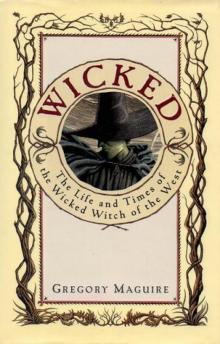 Wicked: The Life and Times of the Wicked Witch of the West
Wicked: The Life and Times of the Wicked Witch of the West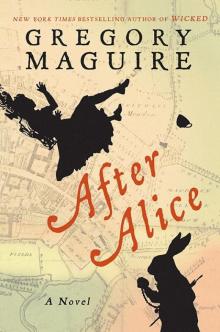 After Alice
After Alice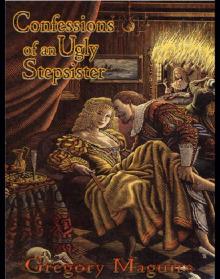 Confessions of an Ugly Stepsister
Confessions of an Ugly Stepsister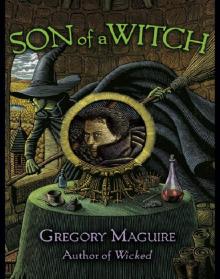 Son of a Witch
Son of a Witch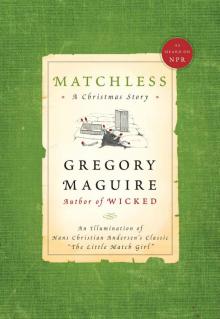 Matchless
Matchless The Next Queen of Heaven
The Next Queen of Heaven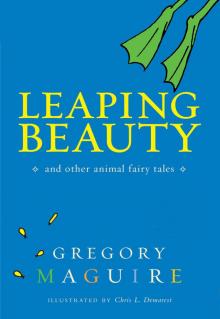 Leaping Beauty: And Other Animal Fairy Tales
Leaping Beauty: And Other Animal Fairy Tales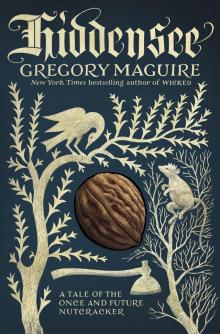 Hiddensee: A Tale of the Once and Future Nutcracker
Hiddensee: A Tale of the Once and Future Nutcracker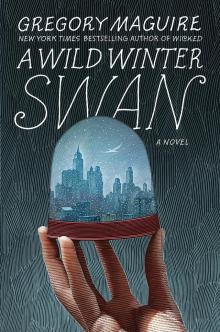 A Wild Winter Swan
A Wild Winter Swan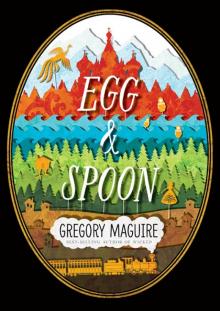 Egg & Spoon
Egg & Spoon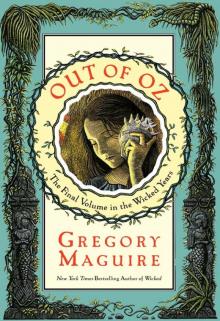 Out of Oz
Out of Oz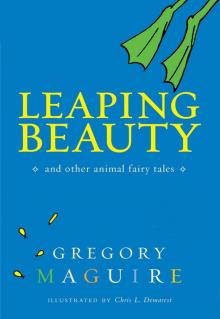 Leaping Beauty
Leaping Beauty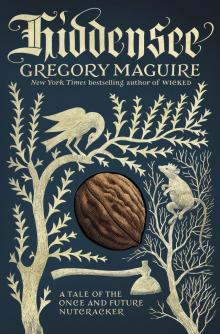 Hiddensee
Hiddensee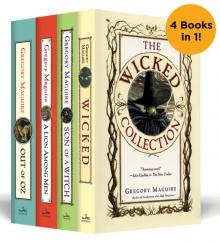 The Wicked Years Complete Collection
The Wicked Years Complete Collection The Next Queen of Heaven: A Novel
The Next Queen of Heaven: A Novel